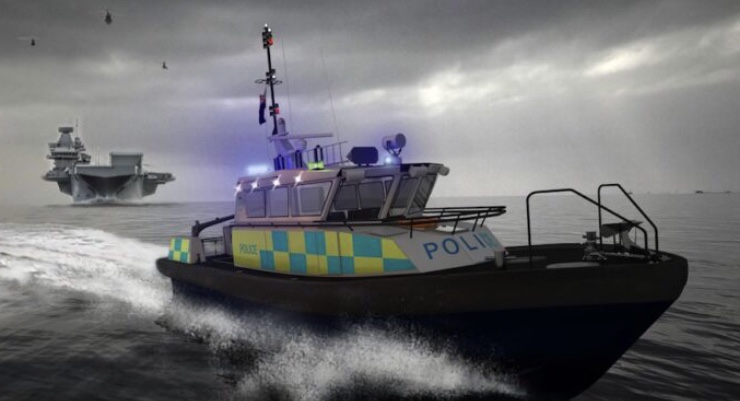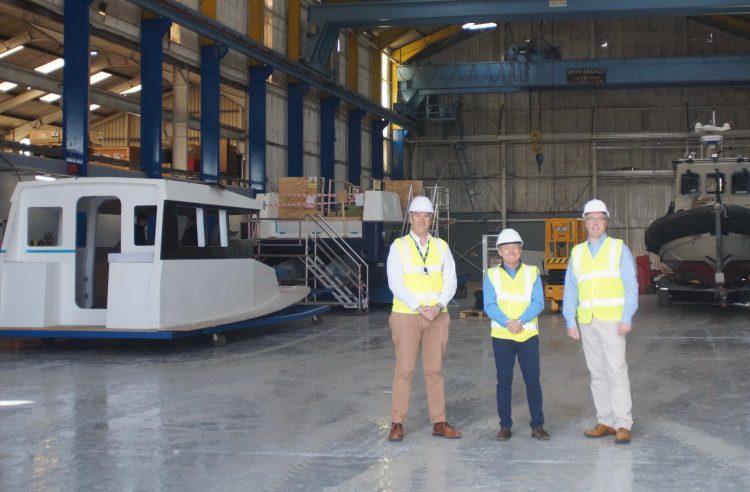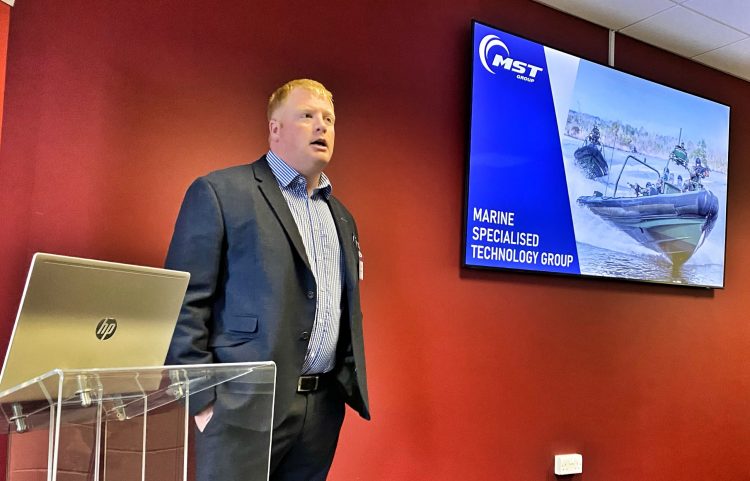Boat builder MST invests £2m in Mersey expansion
Military boat builder Marine Specialised Technology is investing £2m in the expansion of its new Liverpool city region headquarters and is set to see revenues hit £34m. Tony McDonough reports

High speed military boat manufacturer Marine Specialised Technology (MST) is spending more than £2m upgrading its new headquarters and manufacturing facility.
In April MST revealed it had acquired a shipyard in Bromborough in Wirral from the Carmet Tug Company for an undisclosed sum. The business has now relocated from its previous base which was close to Liverpool city centre.
Founded in 2002, MST designs, manufactures and supplies high speed boats to navies in 21 countries. It currently employs 135 people. They are mostly based in Wirral and at a second site in Leyland in Lancashire.
MST business development manager, Christopher Adlington, addressed an audience of maritime industry leaders at Mersey Maritime in Birkenhead. He said the move to Bromborough significantly increased the firm’s manufacturing capacity.
In summer 2021, MST secured a £36m contract to build 18 police patrol craft for the Ministry of Defence (MOD) and Gibraltar Defence Police (GDP) Forces. And in 2020 it won a £9m MOD contract to build two replacement boats for the Gibraltar Squadron Fast Patrol Craft.
Christopher added the relocation offered capacity to meet growing demand for its vessels. This is set to fuel a surge in revenues. In 2017 the company turned over £12.5m and this rose to £14m in 2021. In 2022 revenues are projected to hit £27m and then £34m the following year.
“Our portfolio covers a whole range,” he said. “We have delivered more than 500 craft since 2002 and currently there are around 60 boats on order over the next couple of years. It is a healthy order book going forward.”
Originally founded in 1974 by McTay Marine, the Bromborough shipyard produced 120 vessels before going into liquidation in 2015. It was subsequently taken over by local tug operator Carmet Marine.
The new facilities boast 25T overhead travelling gantry cranes, a 90m 700 tonne slipway that launches directly into the River Mersey and a 100T WISE Amphibious Boat Travel Hoist which provides additional boat launch and recovery facilities and access onto the hard standing areas.
MST is one of the world’s leading manufacturers and maintainers of high-speed boats for global defence and security markets and the new facilities will allow the company to significantly expand its operations.
“What sets us apart is that we are a one-stop shop,” explained Christopher. “Many of our competitors contract out the design and engineering and the technology. We have it all in-house including naval architects. We do after sales, service and maintenance.
“MST Group is made up of a number of divisions. We are one of the largest manufacturers of dedicated military and commercial craft in the world. Our range now goes far beyond the capabilities of our competitors.
“It covers everything from inflatable boats of around four metres, traditional RIBs (rigid inflatable boats) from around five to 13 metres and high speed workboats from five to 24 metres. The acquisition of the yard has really allowed us to expand the offer.”
What you might call MST’s flagship product is its range of FRISC boats. FRISC stands for fast-raiding interception and special forces craft. MST currently builds them in two sizes – nine meters and 12 metres.
Christopher said: “It is the FRISC boats that have really stood us up in the international market. They are bespoke designs for military customers and are built to a very high standard. And they can also be serviced and maintained in theatre by the end users.
“The Dutch Royal Navy has 54 FRISC. That contract came about when the Dutch military had 60 boats but across seven or eight different variants. They wanted a single design across two lengths.
“We built them boats that have all the same systems. That gave them huge savings. It means they can keep one standard engine in stock. They are now 10 years in and they have signed with us for a mid-life upgrade on the electronics.
“We are now looking to move up the technology on the FRISCs. New ones will be faster – up to 50 knots or 48 with a full load which is around 9.5 tonnes. They are very successful and we have 14 in build at the moment with the possibility of around a further 25 with European partners.”
The business is also finding success with its inflatable landing craft. They can go in the back of vehicles to be transported and then be inflated rapidly for deployment. There are 38 in Japan of the six-metre variants which are in operation with their disaster and rescue service. There is also interest in the craft from France and China.
Special forces want to move equipment across water quickly and not leave any trace behind so there is demand in that area,” said Christopher. “We offer a number of specialised swift water rescue and inflatable products. Everything from lifting to bespoke crafts for special forces. Craft maintenance and service is a dedicated department.”


MST was formed in 2002 by three directors – Ben Kerfoot, Philip Hilbert and Andy Phillips. They felt the small boat market up to that point was more of a cottage industry. There were lots of one-off designs. They wanted to take the industry onto another level. It has pioneered the use of 3D modelling and technology.
For a number of years the company enjoyed year-on-year revenue growth. In 2017 it lost a major boat servicing contract and this saw a flattening of growth. However, with the new yard and a number of new contracts, MST is once again on an upward trajectory.
“We are now seeing major growth,” added Christopher. “And we are building 18 15-metre craft for the MOD which will become the backbone of the UK’s port security. We have contracts in India and things are looking promising in Germany and Poland.
“This is why we needed the new yard. In Liverpool it was really challenging to move the bigger craft from our workshop down to the marina. We needed a police escort, closing the roads – it was a real nightmare. There was a huge cost involved so we are very lucky to have been able to get the new yard.”
Given the sensitive nature of MST’s work, security on the new Bromborough site is critical to keeping and winning customers.
For several years MST has worked with the University of Liverpool on a Knowledge transfer agreement. This offers the business access to world class facilities including Sensor City in Liverpool. The arrangement has also seen university personnel join MST on a short-term and long term basis.
The move to Bromborough is also opening up other opportunities. It can offer fleet services – looking after boats for other owners – and it will offer vessel storage and service, undertaking refit and repair.
MST is also stepping up its own decarbonisation efforts. There are already solar panels in operation at Bromborough and there are plans underway to install wind turbines. The aim is for the business to become carbon neutral ahead of the 2050 Government target.
Christopher said: “The acquisition of this new site means we can invest and develop the business. This is further boosted by the fact we now have direct water access. We are now ready to really accelerate the growth of MST.”
